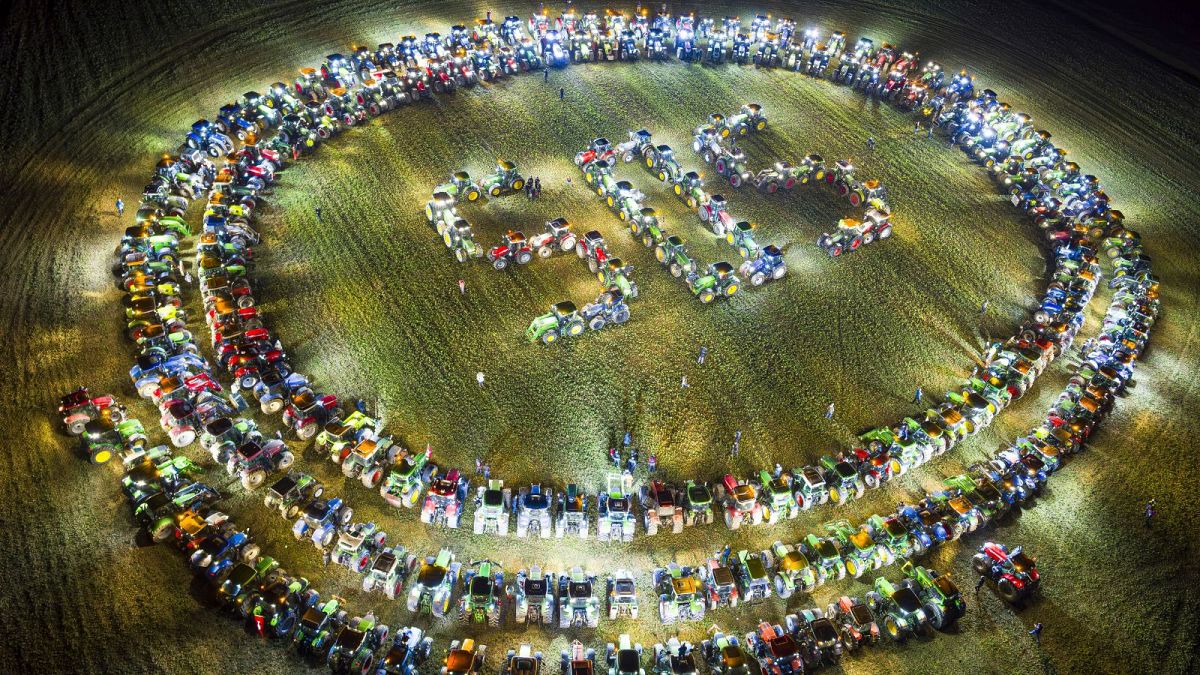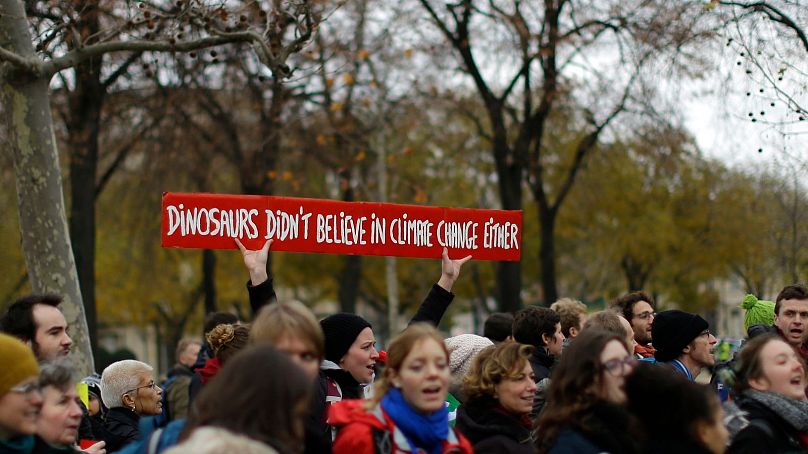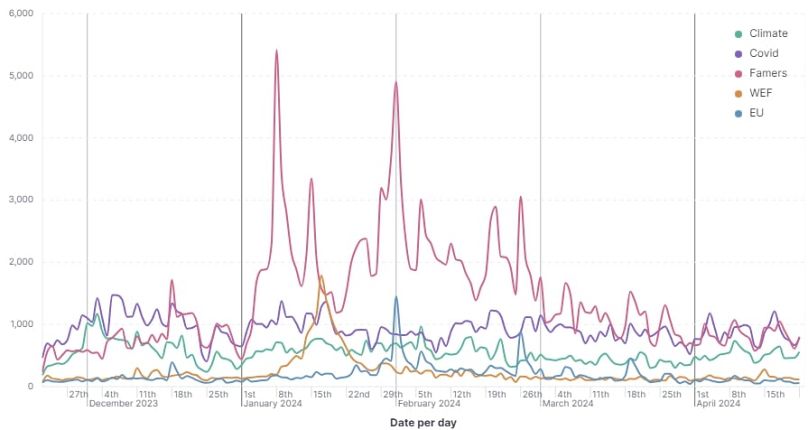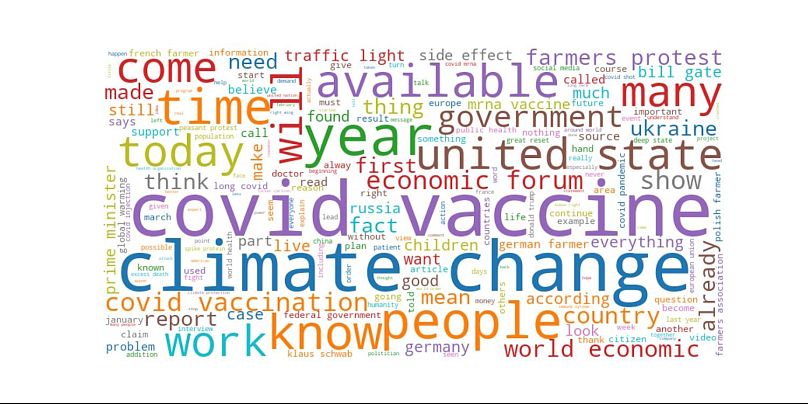We tracked nearly 4,000 conspiracist-leaning Telegram channels and groups across more than 20 European languages - here’s what we found.
On 9 February 2024, Dutch MEP Rob Roos told an audience in Poland that the EU Green Deal was “destroying our food system”. In his closing remarks, he warned, “We are heading toward what I call a new kind of communism.”
Roos is a radical-right politician who currently sits as an independent in the Parliament’s European Conservatives and Reformists (ECR) group, alongside far-right parties including Brothers of Italy and Spain’s Vox.
When he made the comments, for which there is no evidence, Roos was speaking at a relatively minor event in Warsaw. Posted to YouTube, a nearly two-hour video of the event has gained just 1,900 views.
But on social media, a shorter clip of Roos’ comments was shared far more widely by conspiratorial influencers, many of whom have recently been turning their attention to the EU’s climate policies.
On Telegram, a channel called DiscloseTV posted the clip of Roos with a quote that climate change “is a fabricated crisis”. Multiple other channels shared DiscloseTV’s clip, and it quickly gained more than a quarter of a million views.
This was one of countless examples of how conspiratorial narratives about climate change are proliferating on social media ahead of the EU parliamentary elections in June.
Many of the groups behind these narratives previously peddled COVID-19 conspiracy theories, and are switching to climate issues as radical right parties increasingly focus on environmental policy. Over the course of a five-month investigation, we worked with experts at Prose Intelligence research agency to understand how climate denialism is evolving.
What are the main strains of climate disinformation?
Viral narratives have claimed that environmental regulations make hunger “inevitable”, or that, under the guise of preventing pandemics, the EU is seeking new powers to restrict flights and limit civil rights in the name of tackling climate change.
One Telegram post asserting this was seen by 250,000 people before spreading to other platforms.
“Conspiratorial and far-right groups that exploited COVID denialism and antivaxx disinformation for relevance during the pandemic quickly pivoted to other issues to try and stay relevant,” says Callum Hood, head of research at the Center For Countering Digital Hate.
“One of those issues is climate, and farmers' protests in particular which they have presented as a populist uprising against an imagined sinister elite.”
Will climate misinformation impact the EU elections?
Experts say that climate change disinformation now risks entering the mainstream in several European countries and will play a key role in the upcoming election.
Sean Buchan, a climate disinformation researcher at Climate Action Against Disinformation (CAAD), says that conspiratorial influencers above all “chase clout” and are pivoting to posting about the climate and farmers' protests as COVID-19 becomes less interesting to their audience.
“With increasing activity on climate policy, it's an opportunity to exploit people's legitimate fears and concerns and profit from it,” Buchan says.
“It is definitely going to impact the result of the EU elections, because it has affected elections before. We've already seen in Germany how attacks overexaggerating the Greens' heat pump rollout issues has affected their party's popularity.”
Climate disinformation has surged in the last few months
Starting in late November 2023, Euronews Green monitored climate discourse on Telegram, which became a hub for conspiratorial groups during the COVID pandemic. We tracked 3,899 conspiracist-leaning channels and groups across more than 20 European languages. Collectively, posts from these chats were viewed at least 100 million times every month.
Climate-change related output evolved substantially in the period we monitored. It was not a prominent part of the conversation in autumn 2023, with disinformation ‘influencers’ focusing primarily on conflict in Ukraine and Gaza, as well as continuing to post about the pandemic.
But in the months since, narratives around climate change have increased significantly compared to COVID. They surged during and after COP28, which took place between 30 November and 15 December, from an average of 250 posts to a high point of 1,000 posts a day.
During this time, climate discourse jumped by 400 per cent at its peak and has since remained higher than previously. Over the five months since late November, data also shows that daily climate discourse on conspiracy-minded channels has doubled, and remains as prominent at the time of writing.
The channels and groups tracked also leapt on the farmer protests that first broke out in January. There were huge spikes in activity that far eclipsed COVID-related content, as channel owners sought to exploit the protests and reduce farmers’ multifaceted complaints to attacks on the EU’s climate policies.
These posts peaked at four times as many as COVID-related posts. This led to January being the month with the largest number of total views of posts across the channels and groups tracked, reaching 250 million views compared to 131 million views in March. Spikes in posts about the farmers protests also correlated with spikes in posts mentioning the EU and the World Economic Forum, both being popular targets of conspiracy theorists.
Far from being limited to conspiratorial groups, climate denialism and misinformation is increasingly reaching mainstream debate, according to Leonie Pflaller, an analyst for the US-based company NewsGuard which rates news sites.
One example is persistent claims that cold weather events disprove climate change. “The hashtags #climatescam or #KlimaSchwindel (in German) remain popular on X,” Pfaller tells Euronews Green. “We see those especially trending around weather ‘extremes’ such as the colder temperatures in central Europe [in mid April].”
What role is Telegram playing in climate discourse?
Although the likes of Twitter/X and Facebook receive more media coverage for platforming false and misleading information, Telegram has become a key node in the distribution of conspiratorial views.
In many European countries, COVID-sceptics flocked to the largely unmoderated platform during the pandemic and asked audiences to follow them, sometimes after being banned from other platforms for violating those companies’ policies.
In our analysis, German-language content ranked notably high compared to other languages. More than 33 per cent of posts about the climate in our dataset were in German, compared to nearly 36 per cent in English, 8 per cent Spanish, and 7.5 per cent French.
By its own estimates, Telegram has surpassed 900 million users worldwide, making it among the biggest social networks in the world. But the company has managed to avoid closer scrutiny in Europe.
By reporting 41 million monthly average users in the EU in February, just below the threshold for major platforms established by the EU, Telegram has dodged direct supervision by the Commission and more stringent obligations set out under the bloc’s content moderation act.
Eliška Pírková, an analyst at digital rights advocacy group Access Now, says there is a lack of transparency on monthly active user numbers from some platforms, including Telegram. The European Commission has not published any concrete methodology on how to count monthly active users, she adds, leaving the issue in the hands of companies.
A spokesperson for the European Commission told Euronews Green that it will continue monitoring developments to assess whether other platforms should be included in its list of large platforms requiring direct supervision.
Climate disinformation will have a ‘chilling effect’ post-election
Meanwhile, experts say that climate change disinformation is no longer only shared by hardline sceptics, but has been “co-opted into the culture wars” and blended with a variety of anti-establishment grievances, from migration to reproductive rights.
“[Climate change denialism] is often mixed with far-reaching conspiracy theories, claiming that the media, experts and governments are collaborating on this,” Pfaller says.
Joe Düker, a researcher at the Center for Monitoring, Analysis, and Strategy - a nonprofit based in Germany that tracks conspiracy ideologies, disinformation, antisemitism, and right-wing extremism, especially on Telegram - said that conspiratorial ideologies feed into a conspiratorial “worldview”. This means that someone believing in COVID conspiracies would be open to false or misleading narratives about the climate, and vice versa.
“Since conspiracy-ideological and far-right influencers want to appeal to a large audience and wish to tap into emotions such as fear or anger, they tend to focus on topics that are currently widely - and hotly - debated in society,” says Düker. This includes the climate.
The way climate issues are discussed by conspiratorial influencers has also evolved over time, according to Düker. “While climate deniers used to outright deny that climate change is happening at all or that it is not caused by human-generated greenhouse gases, nowadays many climate deniers paint climate science as unreliable or argue that the proposed solutions to climate change do not work,” he says.
Düker adds that climate change can be expected to remain a “relevant topic” for conspiratorial influencers as its impact on the world intensifies.
The impact of climate disinformation will stretch beyond the EU elections, says CAAD’s Sean Buchan.
“Post-election don't underestimate the chilling effect on climate policy,” Buchan predicted. “Elected officials will feel they don't have the political capital to enact climate action, and the necessary transition will be slower, affecting millions of lives negatively.”
Telegram has been contacted for comment.







